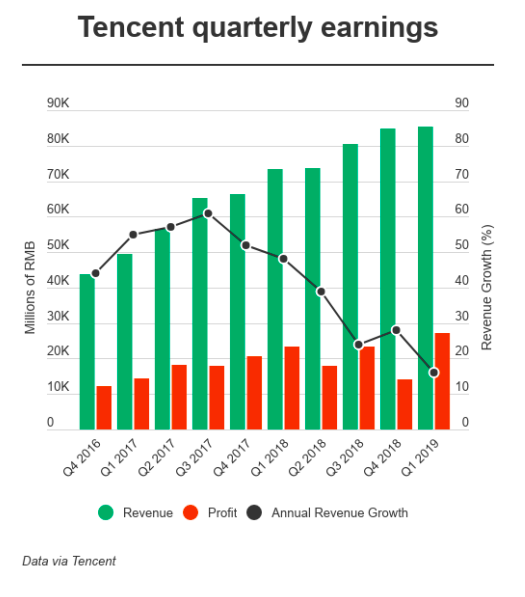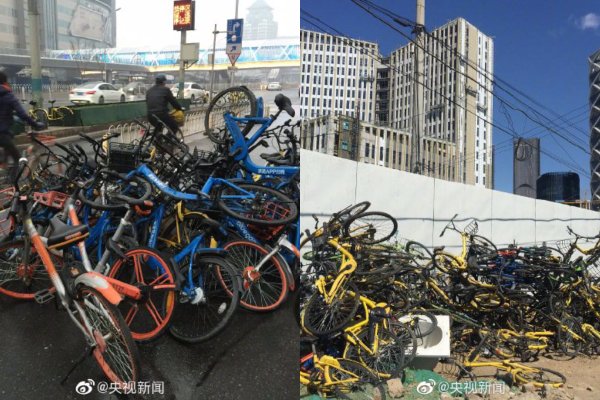Trending in Beijing: Tencent's Average Salary, New Rules for Shared Bikes, and Impressive Square Dancing
The fun, the strange, and the what-on-earth-is-this: a wrap-up of top stories in Beijing as told by the trending hashtags, local press, and general power of the internet.
Average monthly salary at Tencent soars to RMB 70,000

On May 15, Tencent revealed their results for the first quarter of 2019, and despite predictions of a slow quarter due to a crackdown on the gaming industry by Beijing authorities last year, which led to suspended approvals for new games, Tencent reported a net profit of RMB 27.21 billion. Even though their profit surpassed the predicted RMB 19.4 billion mark, this is Tencent's lowest annual revenue growth in years.

Tech Sina dissected the numbers even further. According to the website, the total compensation budget for the first quarter in Tencent was more than RMB 11.616 billion, and the company employs 54,600 people as of March 31. This led to the average employee salary of about RMB 70,000.
While the average number seems unusually high, Phoenix Media argued that it is being distorted by the salaries of the crème de la crème in the company. According to Tech Sina, more than 80 percent of its employees receive a monthly salary of less than RMB 10,000. Meanwhile, the monthly salary estimations of Tencent president Martin Lau (刘炽平) vary, but he reportedly took about RMB 26 million per month in 2018. Talk about driving the average up!
Netizens are whining about their lower-than-Tencent salaries under #腾讯员工平均月薪7万# (Tencent employee's average salary is RMB 70,000).
Shared bikes face new regulations

CCTV's Weibo page announced that Beijing has launched a one-month cleanup campaign for shared bikes. The focus during this period is to fix or get rid of the mountains of abandoned bikes that are crowding sidewalks in the city.
Back in April, the Beijing Municipal Transportation Commission reported that the average usage rate of shared bikes is merely 50 percent. The "cleanup month" is dedicated not only to sorting out the non-functioning bikes but also to clamp down on illegal rentals, unlawful parking and other violations. Those not following the regulations will be punished in accordance with the law, but specific repercussions remain unclear. You can read more on this spring cleaning under #北京清理废弃共享单车# (Beijing cleans up abandoned shared bicycles).
That's not the only reason shared bikes are making headlines these days. The Ministry of Transport released a new administrative measure (in Chinese) on May 16. While it does not target any company specifically (*cough* Ofo *cough*), the measure aims to regulate shared vehicle deposits. Amongst other things, the regulation encourages companies not to ask for deposits at all, but if they do, the refund process should take no longer than two working days.
Netizens have concluded that the catalyst of the new regulation might be Ofo and their deposit refund scandal, in which the company owed over RMB 1 billion in deposits when more than 10 million users applied for a refund. Users are waiting for their money back under #押金最多应2个工作日退还# (deposits should be refunded in two working days).
Square dancers show off their impressive skills

Just when we thought that square dancing amounted to a few simple steps back and forth paired with some ribbon fluttering, these nimble dancers proved us wrong. On May 15夕阳红活动中心 (the Red Sunset Activity Centre) posted a video of a mature couple cutting a rug (and pushing their bodies to the brink) with their impressive choreography.
It was tagged as #广场舞都这么难了吗# (is all square dancing so difficult now?), which attracted more than 36 million readers. The woman is seen performing full splits, which awe the bystanders every time. One netizen pledged dreamily: "I am practicing dance routines every day now" in order sashay with equal flair.
READ: Eating, Manspreading, and Hawking Goods on Beijing Subway Join List of "Uncivilized" Behaviors
More by this author here.
Email: tautviledaugelaite@thebeijinger.com
Images: Weibo, Pandaily, Techcrunch







